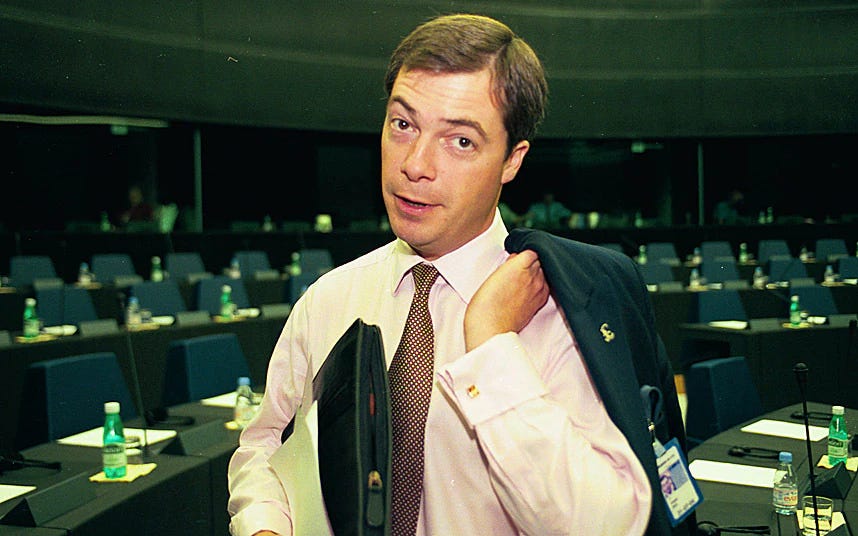A Revolt Is Brewing in Britain, With Farage Leading the Way
Reform UK’s rise is no fluke - It’s the beginning of a reckoning
This year’s local elections were a referendum on a political class out of touch with the people, revealing frustration with empty promises and worsening conditions.
Revolutions rarely announce themselves. They often begin with a crack in the surface.
In Runcorn and Helsby, Labour held the seat by just six votes. Barely a handful. A margin small enough to be dismissed by the commentariat as noise, background static in a complex political cycle. But it wasn’t noise. It was a signal. One that pierced through the stale drone of British politics and made something clear: the ground is shifting.
This year’s local elections weren’t just a midterm report card. They were a referendum on a political class that no longer speaks the language of the people it governs. They revealed a country tired of excuses, tired of bland managerialism, tired of being told that things are improving while everything outside their front door gets worse.
This article was first published on Courage.Media. You can read it on Ayaan’s new platform below, in addition to discovering other new content.
Into that vacuum has stepped Reform UK, a party once dismissed as Nigel Farage’s personal sideshow—fringe, fleeting, unserious. Today, it looks less like a novelty and more like a movement. Its gains may be modest in number, but they’re massive in meaning. These weren’t protest votes from the margins. They were direct hits on what were once untouchable Labour and Tory strongholds—the kind of places where elections used to be formalities. Now, however, they’re battlegrounds.
In Greater Lincolnshire, Reform candidate Andrea Jenkyns shocked the political establishment by storming to victory in the mayoral race. This was not supposed to happen. The Tories had money, machinery, and muscle. Reform had a message. That proved to be enough. Jenkyns didn’t ride in on platitudes or polished talking points. She ran on blunt realism and unapologetic resolve, and it resonated.
Andrea Jenkyns defied the odds in Lincolnshire, beating the Tories with blunt realism and resolve. Reform had no machine—just a message. It worked. Source: X
The rise of Reform is not an accident. It’s the result of years of silent frustration metastasizing into political will. Britons aren’t just voting against something. They’re beginning to vote for something else, something far closer to the truth of their daily lives. Rising crime, out-of-control immigration, collapsing public services, and a cost of living crisis that feels more like a siege than a squeeze. These aren’t abstract issues. They’re realities. And while Westminster dithers, Farage names them plainly. For all his flaws, he speaks like a man who’s actually been in a pub in the last twenty years. Starmer, by contrast, speaks like someone fresh from a committee meeting, clutching a briefing memo and a copy of The Economist, smiling nervously as the country burns.
And that contrast matters. Starmer promised real, meaningful change. Instead, he has delivered more misery wrapped in an inordinate amount of red tape. He inherited the ideological wreckage of the Corbyn years and built something even more lifeless on top of it, a government obsessed with policy reviews, consultation papers, and carefully-worded press releases. Labour today feels less like a party of action and more like a department of administrative delay. It no longer knows how to take risks, speak plainly, or confidently lead. While bills climb and streets feel less safe, voters are handed pilot schemes and five-point plans. It’s politics by flowchart.
Starmer pledged meaningful change but has instead produced bureaucratic stagnation, with policy reviews and delays, all while bills continue to rise and public safety wanes.
And Reform knows it. Farage’s genius has never been intellectual. It’s emotional. He understands mood. He knows what people feel, even if he doesn’t always have a policy paper to back it up. When he talks about knife crime, housing, NHS backlogs, or national identity, he doesn’t sound like he’s quoting research. He sounds like he’s reading the room. That’s a dangerous advantage in politics—especially now, when trust is scarce and anger is abundant.
The Reform vote is not just a right-wing rebellion. It is fast becoming a multi-class revolt: against crime that goes unpunished, services that collapse under their own weight, borders that feel imaginary, and leaders who say all the right things and do none of them. It’s a revolt against a London-centric, Oxbridge-fed consensus that insists everything is fine. It’s not fine.
Labour’s blind spot is its assumption that frustration equals radicalism. It doesn’t. Frustration equals vacuum. And into that vacuum steps whatever force has the guts to speak plainly, even if it does so crudely. Reform UK isn’t flawless. Its policies are underdeveloped. Its infrastructure is thin. Its candidates are untested. But what it possesses is arguably the most valuable currency in modern politics: clarity. And clarity is infectious.
Reform doesn’t need a majority to win the moment. It only needs to shatter the illusion that the old order still holds. Every council seat gained and every razor-thin upset chips away at the fading myth that Britain’s future still lies somewhere between red and blue.
The left is quick to paint Reform as the disease. But that’s a misdiagnosis. Reform is the fever. The real sickness is a political class so cut off from everyday life that it now treats public frustration as a threat and disagreement as dangerous. A system that pathologizes dissent is not fit for purpose. Reform didn’t create this crisis. It’s simply what happens when people get tired of being ignored and patronized.
The British electorate is changing. It’s angrier, more skeptical, and increasingly repulsed by those fluent in Westminsterese. In Farage, they see not just a man who speaks their language, but also someone who recognizes their concerns.
Over 25 years ago, a young Farage went to Brussels to fight for Britain. He was the warning shot. Today, it’s not one man — but a growing movement, victorious and determined.








I only wish Farage could be fully trusted. The way he treated Lowe was horrible.
You got one fact wrong in your opening sentence. Labour did not WIN the seat by 6 votes they LOST the seat by six votes. Reform won.